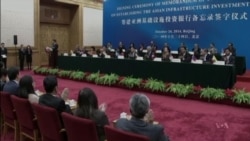Iran has just joined 34 other countries to become the newest member of the Asian Infrastructure Investment Bank or AIIB. The new development bank, launched late last year by the People’s Republic of China, aims to provide multilateral financing for infrastructure projects in Asia.
With its membership growing, the bank is seen by some as a rival to the western-led World Bank and a means for Beijing to flex its economic muscle.
But, Washington may be partly to blame for that.
Major infrastructure projects require money. A lot of it. But neither the World Bank, nor the Asian Development Bank can fund all the projects currently on the drawing board.
That’s where the Asian Infrastructure and Investment Bank comes in - says Amy Studdart at the Center for Strategic and International Studies.
“There’s a huge infrastructure gap in Asia. The World Bank itself estimates that $2.5 trillion worth of investment needs to happen in South Asia and South East Asia alone,” she said.
Others says the failure of U.S. lawmakers to approve reforms to the IMF and World Bank that would have given emerging economies - a stronger voice, may have inadvertently given Beijing the opening it needed.
“And until these reforms are in place, the United States runs the risk of seeing its pre-eminent role in these institutions eroded, especially as others are establishing new and parallel institutions,” said U.S. Treasury Secretary Jack Lew.
Officially, the U.S. recognizes the need for institutions like AIIB, but, behind closed doors, it's accused of pressuring allies to steer clear -- a tactic which may have backfired. So far, 35 countries have joined - including Britain, France and Germany. And why not? says former Goldman Sachs asset manager Jim O’Neill.
“It can only be good for the world economy. And the only surprise to me in this debate is why others don’t think it’s a good idea," he said. "I think it makes the U.S. look a little bit insular, to be honest.”
But there may be reason to tread carefully. Far from being transparent, Amy Studdart says governance of the Beijing-led institution could be a challenge for member countries.
“The fear that the development community still has about this is - It’s China," she said. "The process is very opaque. It’s not clear that any governance initiative or any attempt to shape governance standards in this way that allows for checks and balances will necessarily work over the longer term. “
The concern is that China might use the bank to serve its own geopolitical interests. That need not be the case, says World Bank President Jim Yong Kim, who plans to work closely with both AIIB and the New Development Bank founded by the BRICS countries, Brazil, Russia, India, China and South Africa.
“The World Bank Group sees these development banks as potentially very strong allies in tackling the enormous challenge of bringing much needed infrastructure to the developing world,” he said.
Experts say non-member countries like the U.S. are missing an opportunity to help shape policy at the new investment bank - which officially launches April 15.





